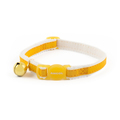As we step into autumn and edge ever-closer to the winter months, it's time to think about the safety of our cats when they venture outside. The mornings are gloomy and the evenings are drawing in earlier and earlier, which means our cats are likely to be out when it starts getting dark and cold. This can make it hard to spot them crossing roads and also mean they seek warmth in dangerous places, such as car engines and garages.
If you haven't already done so, it's worth thinking about getting them microchipped, or adding a tag with contact details to their collar.
Microchipping dogs is now the law, but microchipping cats is optional. There are many reasons why microchipping a cat is so important and why all cat owners, regardless of whether their cat ventures outside or not, should consider it.
What does it involve?
A microchip is a small computer chip that acts as an internal identification tag containing information linking your cat to you. Microchipping your cat is a quick and easy procedure, carried out by a vet, that feels like any other injection. While it may cause minor discomfort for a second or two, your cat won’t need anaesthetic as the chip is only skin deep.
What are the benefits of a microchip?
Put simply, a microchip will help identify your cat if it should ever go missing. As long as the details are kept up-to-date with your name, address and contact number, your cat will stand a better chance of being reunited with you in the following circumstances:
- Your cat gets lost or is ‘adopted’ by another family, or stolen.
- Your cat is found ill or injured and is taken to the vet for treatment.
- Your cat is tragically killed on the road.
- Your cat is found and taken to a shelter, where it may be re-homed.
Although indoor cats are less at risk, it isn’t uncommon for them to escape and go missing. In fact, they are more likely to go missing if they do reach the outside, as it's an unfamiliar environment and they'll be more likely to panic and hide, or run away.
If you think microchipping is something you’d be interested in for your cat, speak to your vet who will be able to discuss the procedure with you and put your mind at ease. While it won't prevent your cat from getting into difficulty during the darker months, it may help bring a little peace of mind knowing your cat could be easily identified if found.
Written by: Hannah








